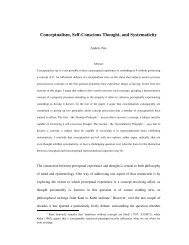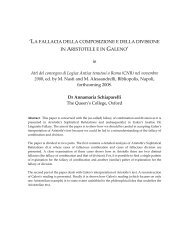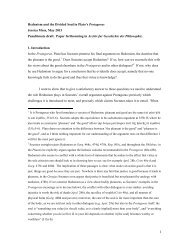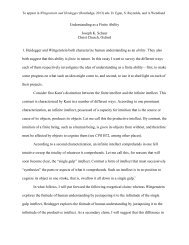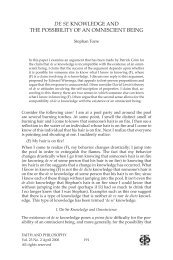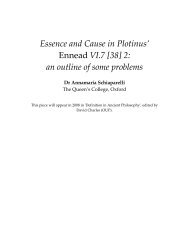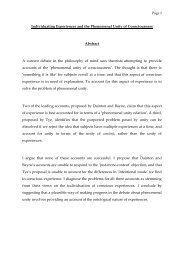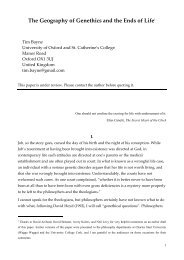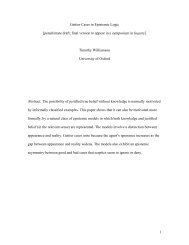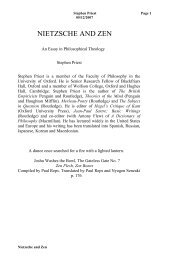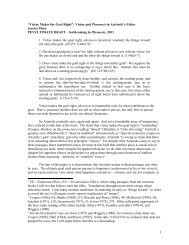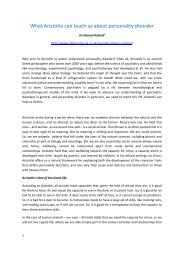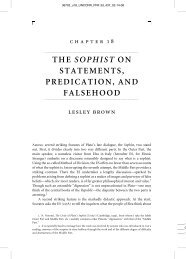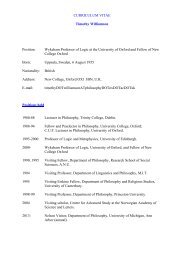Between Saying and Doing: Towards an Analytic Pragmatism
Between Saying and Doing: Towards an Analytic Pragmatism
Between Saying and Doing: Towards an Analytic Pragmatism
Create successful ePaper yourself
Turn your PDF publications into a flip-book with our unique Google optimized e-Paper software.
Br<strong><strong>an</strong>d</strong>om<br />
kind of misunderst<strong><strong>an</strong>d</strong>ing—one that c<strong>an</strong> be removed or ameliorated only by heeding the advice<br />
to replace concern with me<strong>an</strong>ing by concern with use. The recommended philosophical attitude<br />
to discursive practice is accordingly descriptive particularism, theoretical quietism, <strong><strong>an</strong>d</strong> sem<strong>an</strong>tic<br />
pessimism.<br />
Section 3: Extending the Project of Analysis: Pragmatically Mediated Sem<strong>an</strong>tic Relations<br />
On this account Wittgenstein is putting in place a picture of discursive me<strong>an</strong>ingfulness or<br />
signific<strong>an</strong>ce that is very different from that on which the classical project of <strong>an</strong>alysis is<br />
predicated. In place of sem<strong>an</strong>tics, we are encouraged to do pragmatics—not in the sense of Kapl<strong>an</strong><br />
<strong><strong>an</strong>d</strong> Stalnaker, which is really the sem<strong>an</strong>tics of token-reflexive expressions, nor again in the sense of Grice, which<br />
addresses conversational heuristics in terms that presuppose a prior, independent, classical sem<strong>an</strong>tics—but<br />
‘pragmatics’ in the sense of the study of the use of expressions in virtue of which they are<br />
me<strong>an</strong>ingful at all. To the formal, mathematically inspired tradition of Frege, Russell, Carnap,<br />
<strong><strong>an</strong>d</strong> Tarski, culminating in model-theoretic sem<strong>an</strong>tics, is opposed <strong>an</strong> <strong>an</strong>thropological, naturalhistorical,<br />
social-practical inquiry aimed both at demystifying our discursive doings, <strong><strong>an</strong>d</strong> at<br />
deflating philosophers’ systematic <strong><strong>an</strong>d</strong> theoretical ambitions regarding them. I think that<br />
philosophers of l<strong>an</strong>guage have tended to draw this opposition in the starkest possible terms,<br />
treating these approaches as mutually exclusive, hence as requiring that a choice be made<br />
between them. Those who are moved by the pragmatist picture generally accept the particularist,<br />
quietist, <strong>an</strong>ti-theoretical conclusions Wittgenstein seems to have drawn from it. And those<br />
committed to some version of the project of sem<strong>an</strong>tic <strong>an</strong>alysis have felt obliged to deny the<br />
signific<strong>an</strong>ce of pragmatics in this sense, or at the least to dismiss it as irrelev<strong>an</strong>t to properly<br />
sem<strong>an</strong>tic concerns. In the most extreme cases, the attitudes of <strong>an</strong>ti-pragmatist philosophers of<br />
LL1 Text.rtf 12 11/8/2007



